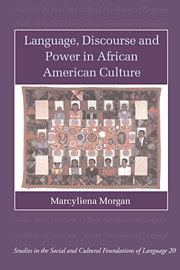Book contents
- Frontmatter
- Contents
- List of maps, figures and tables
- Acknowledgments
- Notes on the transcriptions
- Introduction
- 1 The African American speech community: culture, language ideology and social face
- 2 Forms of speech: verbal styles, discourse and interaction
- 3 Language norms and practices
- 4 When women speak: how and why we enter
- 5 Urban youth language: black by popular demand
- 6 Language, discourse and power: outing schools
- Notes
- References
- Index
- Studies in the Social and Cultural Foundations of Language
1 - The African American speech community: culture, language ideology and social face
Published online by Cambridge University Press: 17 November 2009
- Frontmatter
- Contents
- List of maps, figures and tables
- Acknowledgments
- Notes on the transcriptions
- Introduction
- 1 The African American speech community: culture, language ideology and social face
- 2 Forms of speech: verbal styles, discourse and interaction
- 3 Language norms and practices
- 4 When women speak: how and why we enter
- 5 Urban youth language: black by popular demand
- 6 Language, discourse and power: outing schools
- Notes
- References
- Index
- Studies in the Social and Cultural Foundations of Language
Summary
One hot, humid evening in August 1992, after about a month of fieldwork in Mississippi, I was driving alone on a desolate highway from Magnolia to Lexington. The car radio was blaring as a caller explained that she had ended her relationship with a man who had “done her wrong!” The deejay was in fine form as she kept playing “Drop that Zero,” a song about a woman who could “do bad all by herself!” As I sang along with the fifth broadcast of the tune in one hour, I suddenly noticed something in the night that paralyzed me with fear. It was a road sign that read, “Crossing the Big Black River.”
During my stay in Jackson and Magnolia, people would give me the names and locations of family and friends who lived near the Black River. These names were offered whenever talk turned to the times when “You had to know your place in front of white people!” And “You could get into trouble for speaking like a grown man or woman!” These statements were often punctuated with ironic laughter, knowing nods and tense smiles. Invariably, someone would quietly ask me: “Have you been to the Black River yet? You need to go.” Or begin their story: “There was a store …” or “You remember when Booker T went to that juke joint near the Black River and …” Their voices would trail off, never completing the story, and they would say earnestly, “You need to go there.
- Type
- Chapter
- Information
- Publisher: Cambridge University PressPrint publication year: 2002



